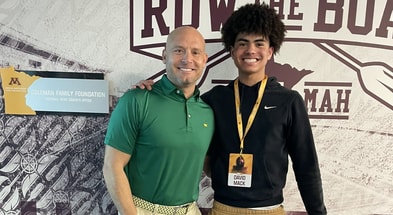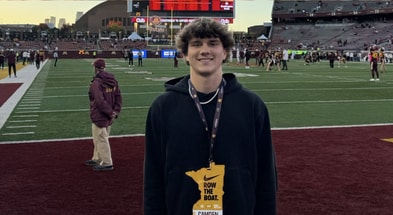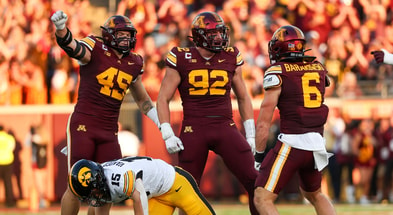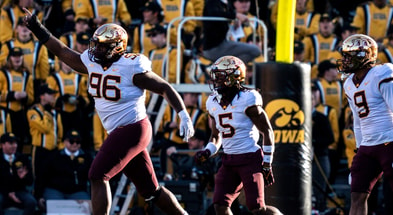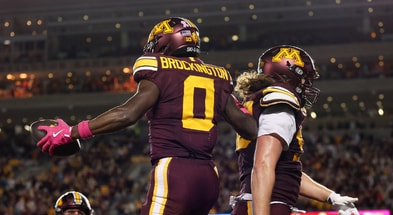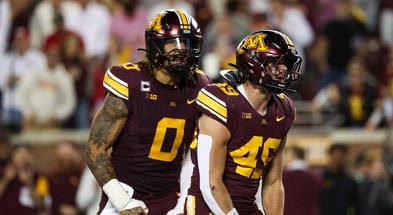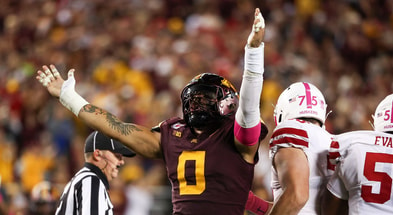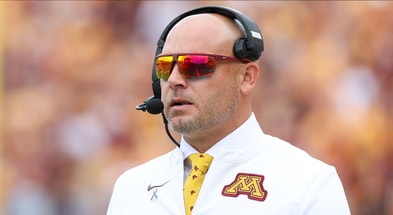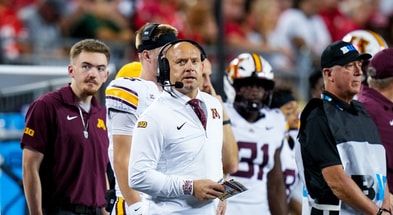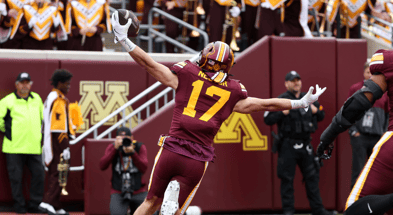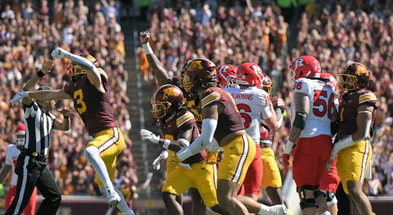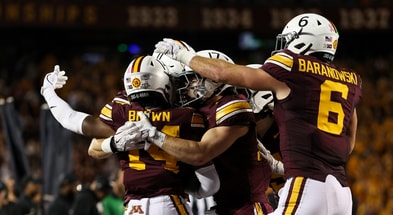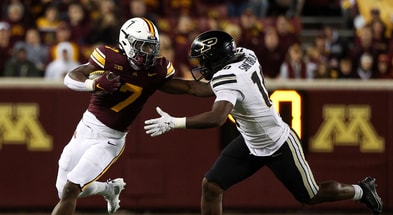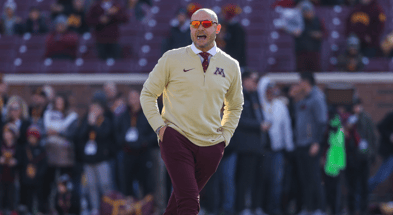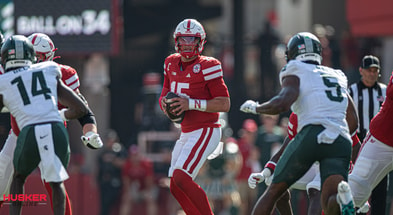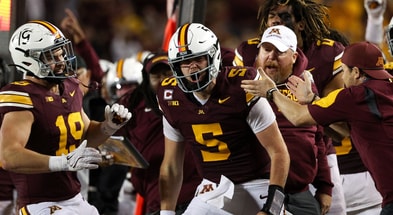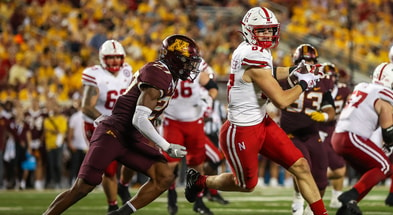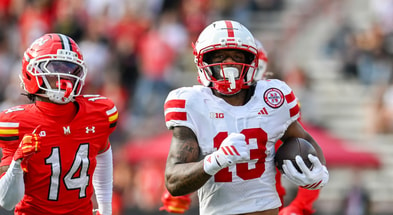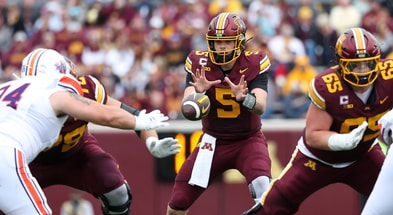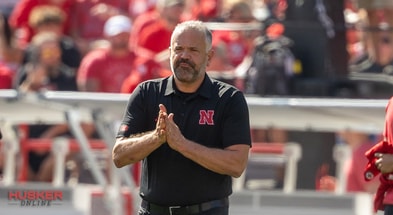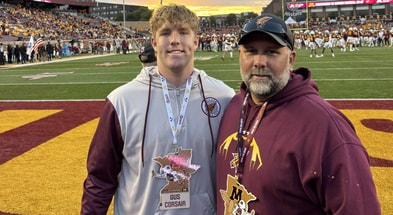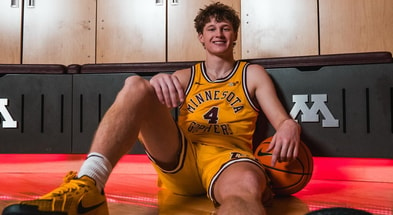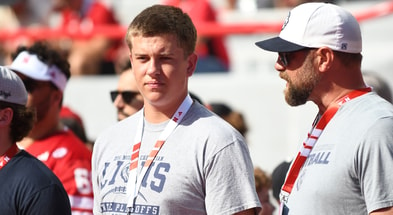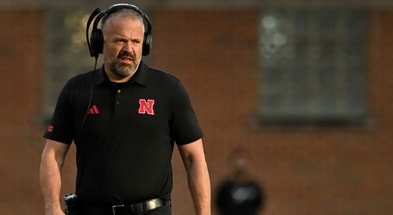Everything that P.J. Fleck said on Monday - Iowa Week Edition
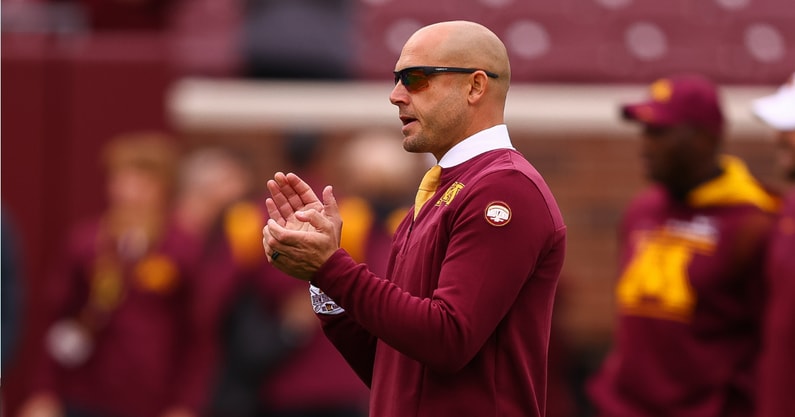
Here’s everything Minnesota head football coach P.J. Fleck said on Monday ahead of this week’s matchup agaisnt Iowa.
Opening Statemnt
Fleck: All right, good morning, everybody. Thanks for bumping that back a few minutes — appreciate that. Just want to start our press conference by congratulating Greg Eslinger again for his induction into the College Football Hall of Fame.
I know we celebrated him during the game. That was a really special moment. As a football coach, you don’t necessarily get to be that involved in that celebration during the game, but what an ovation our fans gave him — and rightfully so. One of the greatest players ever to play at the University of Minnesota.
We look forward to celebrating with him in December at the induction ceremony, which we’ll be at. Really, really excited for him and his family. That’s a huge accomplishment — well-earned, well-deserved — and we look forward to many Gophers down the road having that same type of ceremony and celebration, because I feel like we can get a lot of those players inducted at some point.
Really happy for him and his family.
So with that, we’ll open it up for questions.
Q: When you look at what you guys were able to do tackling-wise in practice, and the focus on that, what did you do blocking-wise to see an improvement on the practice field?
Oh yeah — well, let’s go back to the tackling piece. It’s not like we did anything different. Remember, we talked about that before, right? It was more of doing the same things, but maybe emphasizing a little bit more.
We didn’t go out there and scrimmage and beat up our guys — that’s robbing Peter to pay Paul. There’s a law of diminishing returns. When you’re in the middle of the season, that’s not the time to do that.
That’s why you have to work on those things intentionally in training camp and the offseason. You’ve got to talk about how much you’re actually going to tackle and plan that out — it can’t just be reactionary.
When we do the tackling convention, as I said, it usually lasts about three to four minutes. This time it was close to 25 to 30 minutes. I think they got the point without us having to put players in harm’s way. They just kept doing it over and over and over, and none of them blinked an eye.
They kind of looked at me like, “This is pretty long,” but they got the point of what we were trying to do.
As for running the football, we kind of went back to our original line of scrimmage — back to what we were at the beginning. As we shuffled guys around based on who we were going to play and certain performances, I knew we had the right five or six guys. But maybe they were better at different positions than I initially thought.
Brian Callahan and I met, and I said, “Let’s just go back to what we’re doing. Let’s go back to where they originally played and get them better at those positions.” Instead of thinking maybe it’s the position, let’s just make them better at that position.
It wasn’t like we did middle drill for an hour — we didn’t do that either. But it was about mindset and attitude.
The game plan helped dictate that, too. We weren’t down 14–0 or 10–0. We were down 3–0, which is manageable.
We knew we had to run the football to win that game. Not just because we hadn’t run it well, but because the game required it. And our players knew that. They attacked that week really well, and I thought they executed that mindset throughout the game.
Q: When you got here, you talked a lot about building culture. Now in your ninth season, you have cultural sustainability. What are the benefits of that?
Fleck: I think it’s critical — especially in 2025. We’re playing a team that’s had their head coach for 27 years. The longevity of their coordinators, especially on the defensive side, is impressive.
You’re always going to have player attrition — guys graduate or move on to the NFL. Nobody can stay in college forever. This isn’t Old School the movie. You’ve got to move on. (Randy’s laughing — he knows what movie I’m talking about.)
I want my coaches to move on and become head coaches too. I think we’ve had five, six, maybe seven coordinators move on over the years, including from Western Michigan.
But I also think it’s important to have people who want to stay — assistants who don’t necessarily want to be coordinators, but love their roles. The strength coach, general manager, director of player personnel, and the athletic director — those people are vital.
You go through fun times like Saturday, but also hard times. You want those same people around when things are tough because you know how they’ll respond.
Culture, to me, is about connecting people. That connection doesn’t mean it’s always easy or fun — but it means you know how everyone responds to adversity.
We’ve had the same defensive system here for years, even with multiple coordinators. Same offense, though we adapt it to our players and coaches. We know what works here, and what type of person works here.
If all those roles constantly change, you get a hodgepodge — and it’s hard to connect people or build consistency.
If one year it’s “Row the Boat,” and the next year it’s something else, that’s reactionary. “Row the Boat” is constant — good times, hard times, calm seas, storms — we row the boat.
Everyone knows what to expect. People can say what they want about me or our program, but they know what to expect. That’s the head coach’s job: to be the cultural coach, the expectation coach, the accountability coach.
Everyone who walks in here knows the standard. I know what’s expected of me, too. The culture keeps us accountable.
Q: You mentioned your defensive coordinator, Danny Collins. What are some of the wrinkles or stamps he’s put on the system this year?
Fleck: That’s a really good question. Danny’s been with me 13 years — he’s seen four coordinators before him, all within the same system. He’s made it his own.
We’re still aggressive, but I thought last year we were ultra-aggressive — blitzing more, letting guys play fast. Danny checks every box and brings discipline while still allowing guys to play fast.
He’s kind of a mix between Joe Rossi and Corey Hetherman — diligent, detailed, and thorough. We do a lot schematically, but he simplifies it for players so they can play fast.
He’s also grown so much as a leader. I used to tell him years ago, “You’ve got to get better in front of the room.” We do this “coaches series” every Thursday — a staff member runs the team meeting. Danny kept doing it, kept improving, and now he’s one of the best I’ve ever had in front of the room.
He’s earned it. His story — 13 years, sleeping in the janitor’s closet — that’s real. That work ethic doesn’t make you a good coach by itself, but it gives you the best chance to become one.
He still keeps an air mattress in his office. That’s his way of maximizing himself, especially on short weeks. I respect that about him.
He’s gotten so much better in so many areas, and I’m really proud of him.
Q: What challenges does Iowa quarterback Mark Gronowski present?
Fleck: Where do you want to start? He runs the ball like a running back and throws it like a quarterback. He’s really intelligent — different from Raiola in a lot of ways.
He’s like a running back playing quarterback. If you could combine Darius and Drake — that’d be him.
He’s a winner. All he’s done is win. That shouldn’t be lost on anybody.
I’ve got a lot of respect for Coach Ferentz — he’s sustained it for nearly three decades. Gronowski plays with grit, intelligence, and toughness. He understands situational football. That’s a scary combination.
Q: You’ve been to Kinnick Stadium a few times now. What makes it such a difficult place to play?
Fleck: It’s incredibly loud. It’s hostile. It’s full of tradition. Their fans really care about Hawkeye football.
It’s a unique place. Somebody once asked me what the hardest place to play is — taking your own stadium out of it — and I’ve always said Kinnick.
Even back when I was at Northern Illinois, or as a GA at Ohio State when we were No. 1 in the country, that night game at Kinnick was one of the toughest environments I’ve ever seen.
Their team never beats itself — disciplined, physical, consistent. It’s like they just plug and replace: same body type, same effort, same system — and they win.
Q: With that rivalry and atmosphere, how do you prepare your players to stay composed?
Fleck: Football is a game of emotion. We want our players to play with emotion — just not become emotional.
“Emotional” means you let the outside dictate your behavior. We don’t want that.
We know what kind of game it’ll be, so my job is to make practice this week as hostile as possible. We’ll pump in crowd noise, music, and even things they might hear yelled from the stands.
Our creative department helps with that — they come up with things that could be said. You can’t replicate Kinnick exactly, but we’ll simulate it the best we can.
Q: What did you think of Karter Menz’s performance Friday?
Fleck: Karter’s a great example of our developmental program. He’s a Dakota kid — kind of an in-state guy for us. Long, twitchy, great athlete.
It’s taken a couple of years for his body to get where it needs to be — he’s fully bought into nutrition, diet, and the weight room.
He and Jaxson Howard were both players of the game. I told the team: the more selfless we are, the better we’ll be.
There was a time when Boye Mafe was the guy, then Thomas Rush came on. We split reps — and one of my favorite photos is them celebrating a sack together. That’s what we’re building with Jaxson and Karter.
Karter’s getting better every week. He’s just scratching the surface of how good he can be. This is only the beginning.
Q: One last one — Daniel House asked about the I-formation looks. How did that come about, and how did it impact the run game?
Fleck: We’ve had that in our system — worked on it in the spring. It gave us different angles against Nebraska’s defense, which is very impressive — long, twitchy, and deep.
The I-formation allowed us to create better angles and motion to move their linebackers.
Frank Bierman was a huge part of that — one of our most selfless players. He’s technically a tight end but played fullback and set the tone.
That formation helped us control the flow early. It wasn’t just about numbers but about angles and mindset.
It was a “jab” kind of game — lots of little hits, like UFC shin kicks. They’re not pretty, but by the second half you see the impact. Then you can go for the uppercut.
Every game’s different, but that plan fit that week perfectly.
Join Gophers Nation for ELITE Minnesota coverage!
GophersNation.com provides everything that passionate Minnesota fans expect and want: Wall-to-wall coverage of Gophers athletics and recruiting.
Join the Gophers Nation community and receive all the benefits that come with it:
- Elite team and recruiting coverage of the program you love.
- Interact with other passionate Gophers fans on our Inside Gophers Nation board
- Exclusive access to the Gophers Nation staff, who are always ready to answer your questions.
- Access to the premier network in college athletics (On3 + Rivals)
- Plus much more!
SIGN UP: Join GophersNation’s Minnesota community today for $1.
Subscribe to our YouTube Channel
Talk about it inside Inside Gophers Nation
